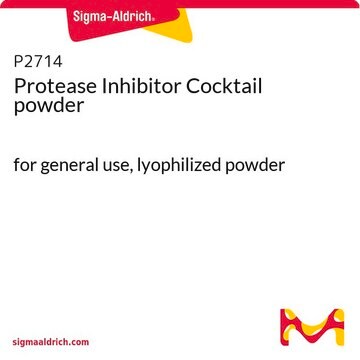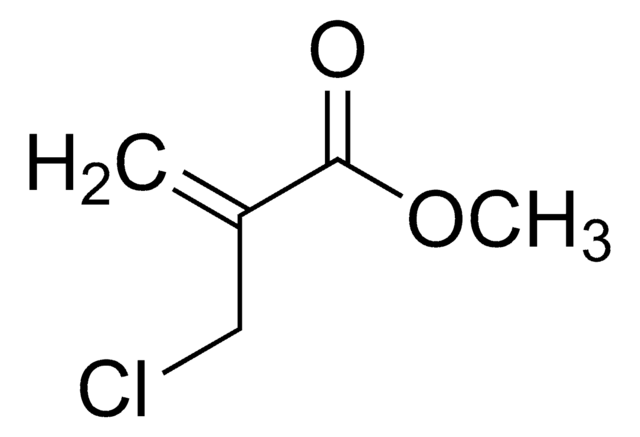MSSAFE
Protease and Phosphatase Inhibitor Cocktail
MS-SAFE, powder, Protease inhibitors: serine, cysteine and aspartic proteases and metalloproteases. Phosphatase inhibitors: tyrosine, serine/threonine, acid and alkaline phosphatases.
Synonyme(s) :
Mass Spectrometry Safe Protease and Phosphatase Inhibitor Cocktail
About This Item
Produits recommandés
product name
MS-SAFE Protease and Phosphatase Inhibitor,
Description
for use with mammalian cell and tissue extract, lyophilized powder
Niveau de qualité
Forme
powder
Solubilité
water: 0.1 g/mL, clear, colorless
Température de stockage
2-8°C
Description générale
- Serine, cysteine and aspartic proteases, and metalloproteases
- Tyrosine, serine/threonine, acid and alkaline phosphatases
Spécificité
Phosphatase inhibitors: tyrosine, serine/threonine, acid and alkaline phosphatases
Application
Caractéristiques et avantages
Compatible with downstream sample processing such as His-tagged protein purification and phosphopeptide enrichment
Allows accurate measurement of protein activity and identification of phosphorylation sites.
Composants
- Bestatin hydrochloride
- Leupeptin
- Phosphoramidon disodium salt
- Pepstatin A
- Elastatinal
- Aprotinin
- Nafamostat mesylate
- Antipain
- Okadaic acid
- Sodium fluoride
- Sodium orthovanadate
- Bromotetramisole oxalate
- β-lactose
- DL-leucine
Quantité
Forme physique
Mention d'avertissement
Warning
Mentions de danger
Conseils de prudence
Classification des risques
Acute Tox. 4 Oral - Eye Irrit. 2 - Skin Irrit. 2
Code de la classe de stockage
11 - Combustible Solids
Classe de danger pour l'eau (WGK)
WGK 3
Point d'éclair (°F)
Not applicable
Point d'éclair (°C)
Not applicable
Certificats d'analyse (COA)
Recherchez un Certificats d'analyse (COA) en saisissant le numéro de lot du produit. Les numéros de lot figurent sur l'étiquette du produit après les mots "Lot" ou "Batch".
Déjà en possession de ce produit ?
Retrouvez la documentation relative aux produits que vous avez récemment achetés dans la Bibliothèque de documents.
Les clients ont également consulté
Contenu apparenté
Select different protease inhibitor types based on your needs to prevent protein degradation during isolation and characterization and safeguard proteins in sample prep.
Notre équipe de scientifiques dispose d'une expérience dans tous les secteurs de la recherche, notamment en sciences de la vie, science des matériaux, synthèse chimique, chromatographie, analyse et dans de nombreux autres domaines..
Contacter notre Service technique















